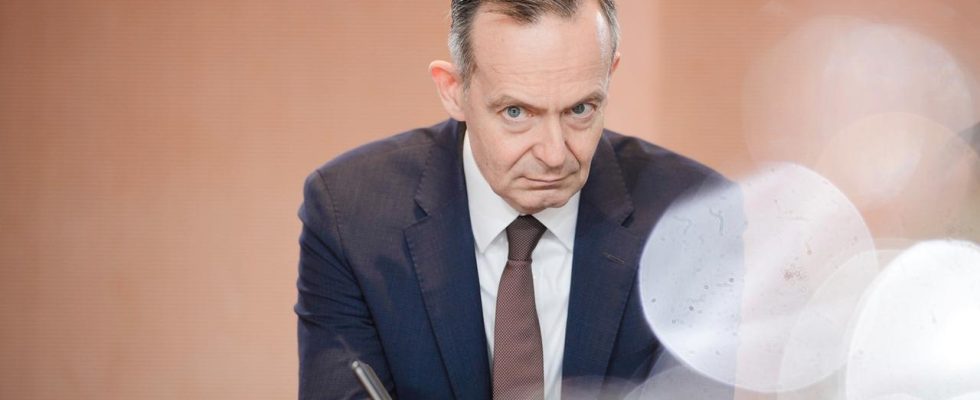Labor disputes are currently affecting air and rail transport. Transport Minister Wissing has now called on the unions to take people’s needs into consideration. There must be an Easter peace at the start of the holidays.
Several strikes at Deutsche Bahn and in air transport are currently keeping passengers and passengers in suspense. Federal Transport Minister Volker Wissing has therefore warned the unions to refrain from industrial action in travel transport, at least over Easter.
“I appeal to the unions to declare an Easter peace if the collective bargaining disputes in rail and air transport are not resolved by the start of the holidays,” the minister told the “Neue Osnabrücker Zeitung”. The unions should make it clear in good time that there will be no strikes during the Easter period. “We also have to meet the needs of the population.”
Families are not parties in the collective bargaining disputes. “Easter peace” is needed so that people don’t have to worry about not seeing each other over the holidays. The minister also reiterated his conviction that it was necessary to examine an adjustment to the right to strike. But that should only happen once the current collective bargaining disputes have been resolved.
90,000 airline passengers are affected
There are currently no agreements in sight in the collective bargaining disputes. Today alone, renewed warning strikes by security staff at five German airports largely brought operations to a standstill.
The locations affected were Berlin, Hamburg, Stuttgart, Karlsruhe/Baden-Baden and Cologne/Bonn, where the industrial dispute began on Wednesday evening. As a rule, all departures at the airports were canceled because passengers and goods could no longer go through security checks. There were also numerous failures during the landings.
According to estimates by the airport association ADV, more than 580 flight connections are likely to have been canceled and 90,000 travelers would have to reschedule. For Friday, ver.di has also called for warning strikes among security workers in Hanover, Dortmund, Weeze, Dresden, Leipzig and also in Karlsruhe/Baden-Baden.
Industry speaks of “horror scenario”
The airport association ADV spoke of a “horror scenario for the affected passengers”. The strikes would have far-reaching consequences for individual mobility and economic processes. Industrial disputes must always be proportionate and the last resort. ADV Managing Director Ralph Beisel demanded that airports, as critical infrastructure, should be protected “from strike escalations”.
The Federal Association of German Airlines (BDF) campaigned for legal rules in the critical transport sector. Arbitration obligations, mandatory notice periods and emergency service regulations are necessary. They are intended to make it possible to “maintain a minimum level of mobility for people and goods”.
Ver.di wants to increase hourly wages
The strikes particularly hit Lufthansa. The week before, their ground staff went on a warning strike. The company was only able to offer around 10 to 20 percent of its flights. The ver.di union is demanding 12.5 percent more money for the 25,000 Lufthansa employees for a term of twelve months, while the airline has so far offered 10 percent for a term of 28 months. The next round of negotiations started today.
The collective bargaining dispute between the currently striking aviation security is, however, about the working conditions of around 25,000 employees of private security service providers. On behalf of the Federal Police, they check passengers, staff and luggage at the entrances to the security area.
Ver.di is calling for an hourly wage increase of 2.80 euros over a period of twelve months, with overtime bonuses starting more quickly from the first hour of overtime. So far, five rounds of negotiations have failed to produce any results in the conflict. A sixth meeting is scheduled for March 20th.
You can no longer rely on the train either
The situation is not easy for passengers because, due to another tariff dispute at Deutsche Bahn, they cannot currently rely on rail. Nevertheless, there have already been two parallel industrial disputes in air and train transport.
More money is not always the focus of collective bargaining disputes. The crux of the collective bargaining dispute at the railway is the GDL’s demand for a shorter working week for shift workers from 38 to 35 hours – with the same salary.
Federal Government has little understanding
This has recently sparked criticism from the federal government. Federal Minister of Economics Robert Habeck, for example, advocated on Wednesday evening that work should be given greater value, that it should be seen as something positive and that it should also be remunerated appropriately.
“In any case, there is a bit too much strike or advertising going on at the moment for less and less work. And we really can’t afford that at the moment,” said the Green politician at the “Future Day for SMEs”. “I am observing a mentality in which people no longer strike for higher salaries, but rather for less working hours,” said Finance Minister Christian Lindner at the same event.

